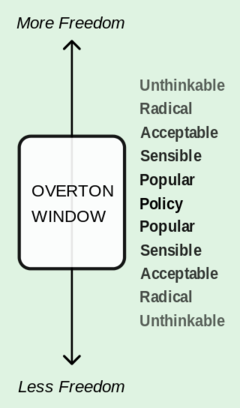Many thanks to our Patrons who cover ~2/3 of our hosting bill. Please join them if you can.
Overton window
Jump to navigation
Jump to search
 This page imported content from Wikipedia on 15 January 2020.
This page imported content from Wikipedia on 15 January 2020.
Wikipedia is not affiliated with Wikispooks. Original page source here
 | |
The Overton Window is the range of policies politically acceptable to the mainstream population at a given time.[1] It is also known as the window of discourse. The term is named after Joseph P. Overton, who stated that an idea's political viability depends mainly on whether it falls within this range, rather than on politicians' individual preferences.[2]
The Overton Window frames the range of policies that a politician can recommend without appearing too extreme to gain or keep public office given the climate of public opinion at that time.[3]
Keeping people passive
Noam Chomsky said in 1998:
- "The smart way to keep people passive and obedient is to strictly limit the spectrum of acceptable opinion, but allow very lively debate within that spectrum - even encourage the more critical and dissident views. That gives people the sense that there's free thinking going on, while all the time the presuppositions of the system are being reinforced by the limits put on the range of the debate."[4]
Related Quotation
| Page | Quote | Author | Date |
|---|---|---|---|
| Edward Bernays | “The conscious and intelligent manipulation of the organized habits and opinions of the masses is an important element in democratic society. Those who manipulate this unseen mechanism of society constitute an invisible government which is the true ruling power of our country... In almost every act of our daily lives, whether in the sphere of politics or business, in our social conduct or our ethical thinking, we are dominated by the relatively small number of persons... who understand the mental processes and social patterns of the masses. It is they who pull the wires which control the public mind.” | Edward Bernays | 1928 |
Many thanks to our Patrons who cover ~2/3 of our hosting bill. Please join them if you can.
References
Wikipedia is not affiliated with Wikispooks. Original page source here